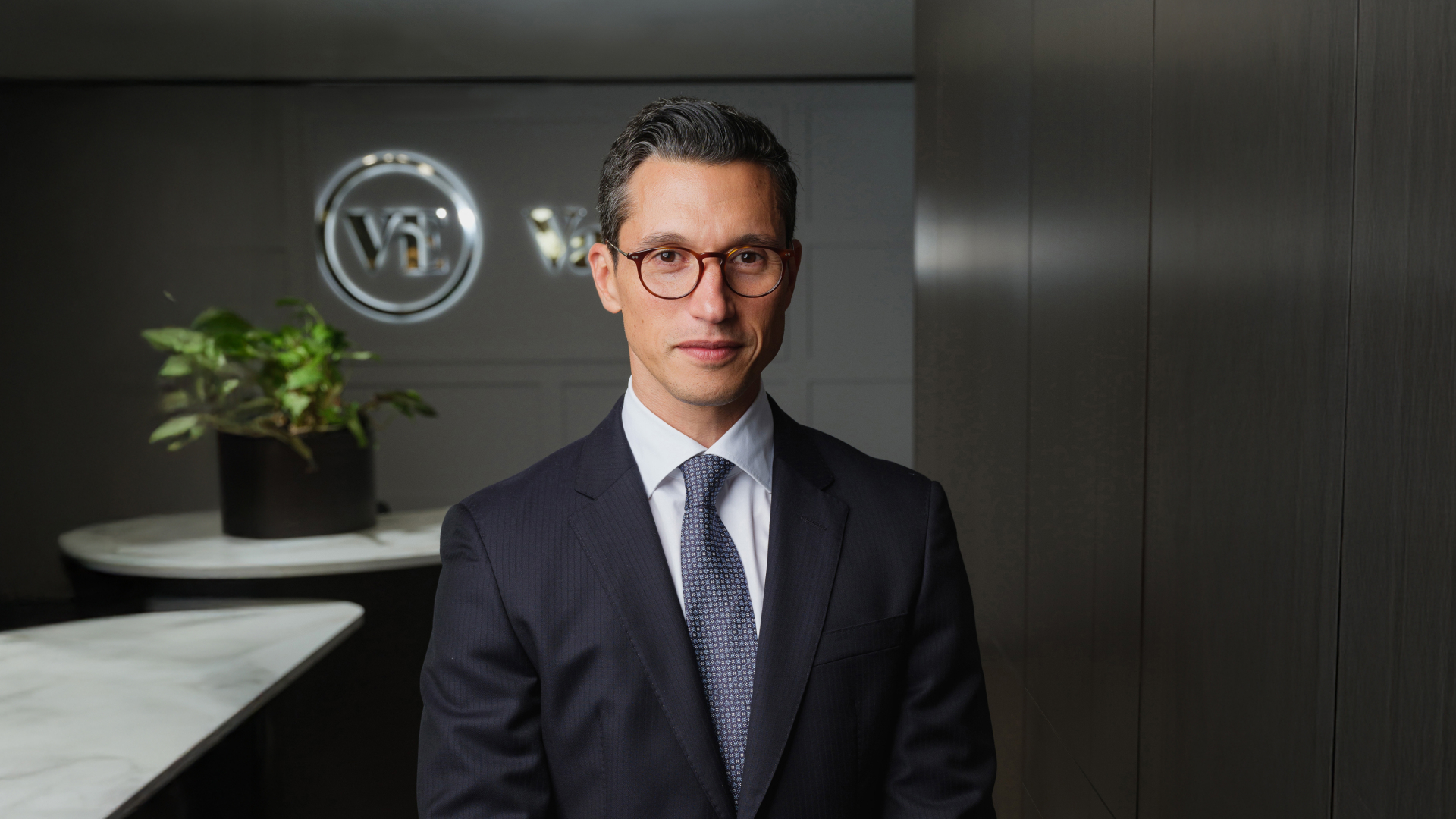From gold to US markets and AI: What VanEck’s Asia Pac CEO says about the future of investing
Global asset manager VanEck celebrated its 70th birthday last week and what began in 1955 as its founder's idea to offer alternative investment options has grown into a global asset manager managing more than $US130 billion.
The firm's founder John C van Eck launched one of the first US mutual funds focused on overseas investment opportunities and in effect pioneered thought in bringing retail investors different ways to diversify wealth creation strategies.
Arian Neiron has run VanEck's Asia Pacific investment outpost in Sydney since its launch in 2012 and steered the group through several investment cycles and a fast-changing environment for wealth creation in Australia.
While Neiron acknowledges the investment landscape is always changing and it's important to adapt, VanEck's founding philosophy of giving investors access to long-term structural winners has remained the same for 70 years.

In this special Q&A, we sit down with Neiron as he reflects on lessons learned building its Australian business, creating wealth, beating inflation and going up against the competition in the ballooning ETF space.
VanEck was founded in 1955 - what problem was the business originally trying to solve for investors, and how has it evolved over decades?
Neiron says the founder John van Eck was a visionary as he wanted to offer US investors the opportunity to diversify into international markets and launched a fund to buy overseas stocks, which was quite a brave idea back then.
"Broadening access to the global investment landscape was part of John’s vision. The other major component was his recognition that the world was constantly changing, and understanding those shifts early was the key for creating real opportunity for clients," says Neiron.
In 1968, the founder's mission saw him launch the first US fund dedicated to gold equities. This was when gold was pegged to the dollar at $US35 an ounce and people saw it as a stable commodity.
However, van Eck saw signs of inflation, upheaval and a coming inflection point. A few years later, the US abandoned the gold standard, sending gold to more than $800 an ounce in the 1970s, before it reached around $US3,360 an ounce today.
"VanEck’s reputation for forward-thinking strategies and resilience through market cycles can be traced all the way back to the early days of the business," says Neiron. "The resilience of our business’ approach can be evidenced in the list of top-performing ETFs for the first half of 2025, where VanEck’s gold equities ETF ranks highly."
What has VanEck’s longevity taught you about market cycles and investor behaviour?
VanEck’s multi-decade history across global markets has underscored one immutable truth: markets are cyclical, but investor behaviour is often linear and emotional.
Nerion says VanEck's core philosophy is to appreciate that markets are cyclical, but investor sentiment often produce sharp short-term swings in valuations.
"The longevity of our global business has taught us that market dislocations, booms and busts are not only inevitable but essential," says Neiron. "These mechanisms ensure capital is reallocated, risk is repriced, and innovation emerges."
For investors, how you respond to sharp price movements or broader downtrends is more important than the cycles themselves in determining long-term returns, Neiron adds.
"From the dot-com bubble and the GFC to the crypto evolution and the current AI revolution, we have observed that fear and greed remain persistent behavioural anchors."
VanEck says many of its investment products, tools, platform and educational features are designed to help investors tune out the noise to focus to make better behavioural decisions. Avoiding rashly selling or buying is one of the commonest mistakes investors make when driven by emotion, rather than rational decision making.
"Ultimately, our history has reaffirmed that endurance and perspective are competitive advantages, not just for investment strategies, but for investors themselves," says Neiron.
What are some major lessons you’ve learned after launching the Australian business 12 years ago?
Neiron says building VanEck Asia Pacific took endurance, conviction, and strategic clarity, with plenty of challenges to overcome along the way.
"When you set out to challenge the status quo, disrupt incumbents, or introduce true innovation into a deeply entrenched system, the journey is rarely smooth. It is arduous, often confrontational and deeply emotional," he says.
"This is not simply about launching products; it is about reshaping mindsets, confronting legacy inertia and inviting scrutiny from an ecosystem resistant to change."
Neiron adds that success in business naturally brings competition. However, he's confident in the future as he argues companies are built on human capital and reckons VanEck Asia Pacific has the best team in the business.
"This, we think, is what sets us apart from our peers. If there is one enduring lesson learned over the last 12 years, it is this: leading with passion and purpose, not popularity, is the path that endures.
"The unfortunate truth is that when forging a new path, most people won’t offer help, period. Many will question your direction. But over time, a clarity of vision and strength of conviction turns doubters into true believers.
"Success is cumulative and hard-earned, it accrues not just in assets, but in trust, reputation and cultural capital."
What are the most important structural shifts in markets you’re seeing now?
Neiron points to the growing debt pile in the US as a primary risk as its federal government extends years of failing to balance its budget by spending far more than it takes in revenue.
He points to the fact credit rating agencies Moody's, S&P and Fitch have all downgraded their ratings on US debt recently, which has spurred a global shift away from holding US dollar debt.
He adds that President Trump's tariff war is likely to push up inflation in the US and the potential economic hit from it is yet to play out.
"Faltering US exceptionalism has put a spotlight on other regions, many of which have seen significant economic growth this year, including Japan, South Korea, India and China," Neiron says.
Another obvious shift and opportunity to make money is artificial intelligence as it creates new opportunities within industries and across internet services, according to Neiron.
"The training and deployment of AI models, particularly in high-density data centres, will also consume exponentially more electricity, and we could see this accelerating the move towards clean energy," he adds.
VanEck Australia now offers 45 ETFs – what’s next in terms of innovation and investor needs?
Neiron says VanEck will also leverage technological innovation to help its research and to deliver the best strategies for investors.
Other opportunities for innovation include new asset classes outside public markets or in different sectors to equities where most retail investors tend to have high exposures already.
"We're entering new asset classes with purpose," he says. "Our approach is grounded in rigorous due diligence, institutional integrity and regulatory alignment. The intent is to offer future-proof portfolios and deliver resilient, uncorrelated sources of return."
If you could only invest in two ETFs personally for the rest of your life, what would they be and why?
"This is a difficult question, as any products we launch in Australia are required to pass the litmus test of being a fund I would personally want to invest in," Neiron responds.
The two ETF picks on the basis of a "moderate risk profile" and "tilt towards growth" are the VanEck Australian Equal Weight ETF (ASX: MVW) and the VanEck MSCI Multifactor Emerging Markets Equity ETF (ASX: EMKT).
"MVW offers a portfolio of companies with higher earnings growth, greater M&A potential and more domestic economic sensitivity. Given the concentration in Australian equity markets, equal weighting not only provides the necessary diversification across sectors and companies, but the opportunity to capture economic transformation trends as well," says Neiron.
The investment boss also reckons it makes sense to bet on emerging equities given a strong growth outlook.
"Structural reforms, expanding middle classes, urbanisation and digital leapfrogging continue are all ongoing trends in these countries that are driving higher potential GDP growth and consumption patterns over the long-term.
The multi-factor approach in EMKT emphasises selectivity and targets factors that harvest risk premia over time and also complement each other."
Neiron says he chose these two ETFs for their outperformance potential and low correlation as a pair, with emerging markets having distinct growth trajectories that are often decoupled from developed markets.
"To optimise the use of my capital, I would split my allocation between MVW and the leveraged version, GMVW, to give me amplified exposure without having to contribute more capital," he adds.
Looking ahead, what are the investment themes that will dominate the next 5 to 10 years?
Neiron says the rise of AI is set to sweep through the investment management sector as much as it will other areas of business and society. By now it's already embedded in investment research and portfolio construction, to enabled more informed decision-making, he says.
"This evolution is changing the role of human judgment in asset management - not replacing it, but enhancing the experience and expertise of skilled portfolio managers," said Neiron.
The chief executive also points to the rise of alternative asset classes such as private credit as a trend set to continue given that it typically offers investors higher yields.
"In a higher interest rate environment, private credit has emerged as an attractive source of income to manage duration risk, offering access to parts of the economy previously unreachable through traditional public markets," says Neiron.
"Add the evolution of healthcare innovation, demographic-driven consumption shifts and the repricing of sovereign debt and inflation risk, and the investment roadmap becomes clear: we think the next decade will belong to investors who blend innovation, agility and thematic conviction within a disciplined, long-term framework."
5 topics
2 stocks mentioned
2 funds mentioned
1 contributor mentioned
.jpg)
.jpg)